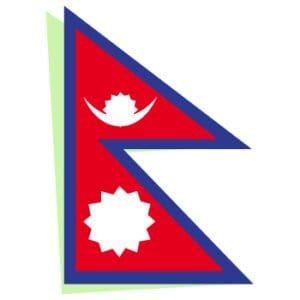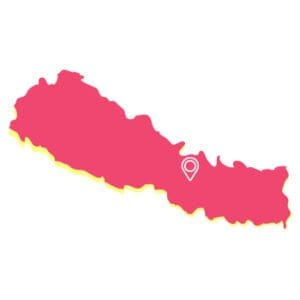
Nepali To English
Nepal:
Nepal is a multicultural country in South Asia. It shares its borders with China, Bangladesh, and India. 125 distinct ethnic groups in Nepal follow their own unique cultures. Festivals, folklore, literature, philosophy, and food items are some of the things through which the culture of Nepal is expressed by its people. Although Nepal has a fast-growing economy, the situation is still not ideal for poor people. The country ranks 162nd in the world by GDP per capita. More than 30% of Nepal’s population lives on a daily wage of $1.91 to $3.3. The 17 million labor force in Nepal is struggling against poverty every day. As a result, many people immigrate to different countries to escape their current situation.
The Nepali Language:
Nepali is an Indo-Aryan language that is spoken by 25 million people worldwide. It is the official language of Nepal. It is also one of the scheduled languages of India. It is spoken in various Indian states by a few people, including Assam, Uttarakhand, and Arunachal Pradesh. It is also spoken by a quarter of Bhutan’s population. A few speakers of the Nepali language can also be found in Myanmar. It is written in the Devanagari script. Various other Indo-Aryan and Tibeto-Burman languages have influenced it. Nepali has various other names, including Khas kura, Gorkhali, and Parbatiya. It is spoken by the Nepali diaspora community all over the world.

English to Nepali Translation for Business:
Nepal’s fastest-growing economy and 17 million labor force make it the ideal place for foreign businesses. However, the language barrier can be a problem for businesses. 129 languages are spoken in the country as the mother tongue. Although Nepali is the official language, it is only spoken by 45% of the population. Various other languages are spoken throughout the country. Various ethnic groups speak their vernacular. Only 0.01% of the Nepali population speaks English. As a result, a business cannot survive in Nepal without English-to-Nepali translations.
Businesses often undertake English-to-Nepali translation projects in the translation industry, leveraging online translations and collaborating with translation agencies to ensure accuracy. Employing a professional translator fluent in both English and Nepali, whose native language proficiency guarantees precision, is essential for successful business communications in diverse markets.
You should not use an English translation tool If you need business translations. You will need the services of a qualified professional who is not only a native Nepali speaker but also has experience with business translations. Translation software cannot provide the results to help you connect with your audience. You don’t just need to translate English words into Nepali words. You will need someone to ensure that your documents and advertising content fulfill your target audience’s linguistic and cultural needs.

Nepali to English Translation for USCIS:
Many people apply for US immigration every year. If someone doesn’t want their request rejected, they should prepare for everything beforehand. One important aspect of the immigration process is getting your documents translated. You will need accurate Nepali-to-English birth certificate translations before you can apply for immigration. But the translation for immigration is not simple. You can’t turn to translation software for help. You cannot rely on machine translation because we have seen on social media how inaccurate Google Translate can sometimes be. However, it isn’t just about Google Translate. Even if you search for an alternative to Google, it won’t be an option that will be a hundred percent perfect.
For USCIS, ensuring the accuracy of Nepali to English translations is paramount, and quality translations are achieved through a combination of advanced technologies and human translators. Utilizing a professional service with qualified translators, including native speakers, guarantees not only exact translations but also a perfect translation that meets the stringent English language standards and satisfies the specific requirements of the USCIS in various industries. Unlimited translation capabilities provided by translator tools complement the expertise of human translators, ensuring precise and reliable language conversion.
You will need professional translation services for your immigration documents. You will need Nepali to English-certified translations of your documents. Without a certified birth certificate translation, your application will be rejected by USCIS. You will have to repeat the whole process and get high-quality certified translations of your documents.
How to Contact Certified Translators Nepali to Eng?
You don’t need certified translators to translate your documents. However, you will need certified translations that any qualified professional can carry out. Whether you need the services of a certified translator or an experienced one, you will have to do some research to find one. You can look up different agencies and check their reviews to determine whether they deliver quality solutions.
When translating official documents, the aim is to express a basic idea of the source file and explain it fully. You will have to find a professional translation services provider for this purpose. Make sure they have experience in translating documents for immigration. They won’t just translate a sentence into English; it will be a uniquely formatted document. If they have the right experience, they can provide accurate results.
Individuals can utilize a human translation service with a translator tool powered by deep learning algorithms to ensure accurate translations from Nepali to English. Choosing a translation provider offering standard translation services and certification is essential when dealing with legal documents. Reputable agencies often boast an outstanding service record supported by a rigorous quality control process by a dedicated translation team. Efficient translations are guaranteed, alongside robust customer support, ensuring a seamless experience for clients seeking certified translators for Nepali to English.
Once you have found the agency with the best translators on its team, you can contact them through the customer service representative. You can also call the agency directly and discuss the translation of your documents with them. Whether you need English to Nepali or Nepali to Eng translation, you can get the best quality solutions if you choose the right agency. They will know which variety of English your documents need and assign the right expert to your project.
There’s also the free quote option for contacting an agency. You can click the free quote option on an agency’s website, upload the document you need to translate, and select the source and target language. For instance, you must inform the agency that you require English to Nepali translations. Once the task is complete, the certified translation will be sent to you.
Frequently asked questions
What qualifications should a Nepalese translator have?
A qualified Nepalese translator should have:
Language Proficiency: Fluency in both Nepalese (also known as Nepali) and the target language, with a deep understanding of the nuances and idiomatic expressions of both.
Certification: Accreditation from recognized translation bodies, such as the American Translators Association (ATA) or local certification from Nepalese language institutions.
Specialized Knowledge: Expertise in specific fields like legal, medical, technical, or business translation, depending on the needs of the project.
Experience: A proven track record of translating documents accurately and effectively, demonstrated through a portfolio or client testimonials.
Cultural Competence: An understanding of cultural contexts and practices in both Nepalese and the target language environments to ensure translations are culturally appropriate.
What types of documents can a Nepalese translator handle?
A Nepalese translator can handle a variety of documents, including:
Legal Documents: Contracts, court orders, immigration papers, and legal agreements.
Medical Records: Patient records, medical reports, consent forms, and health information leaflets.
Business Documents: Marketing materials, financial reports, business plans, and correspondence.
Educational Materials: Transcripts, diplomas, research papers, and educational brochures.
Government Forms: Applications, official notices, public service announcements, and other official documents.
How can I verify the credibility of a Nepalese translator?
To verify the credibility of a Nepalese translator, you can:
Check Certifications: Ensure the translator has relevant certifications from recognized bodies.
Review Experience: Look at their professional background and ask for samples of previous work.
Read Testimonials: Seek feedback and reviews from previous clients.
Confirm Specialization: Ensure the translator has expertise in the specific type of translation you require.
Conduct an Interview: Speak with the translator directly to assess their proficiency and understanding of your project’s requirements.
What are the common challenges faced by Nepalese translators?
Common challenges faced by Nepalese translators include:
Complex Terminology: Handling specialized terminology, especially in fields like law, medicine, and technology.
Cultural Nuances: Accurately conveying cultural nuances and idiomatic expressions in the target language.
Dialect Variations: Dealing with various dialects and regional variations within the Nepalese language.
Consistency: Maintaining consistency and accuracy across large documents or multiple projects.
Confidentiality: Ensuring the confidentiality and security of sensitive information during the translation process.
Why is cultural competence important for a Nepalese translator?
Cultural competence is crucial for a Nepalese translator because:
Accurate Translation: It ensures that translations are not only linguistically accurate but also culturally appropriate, preventing misunderstandings or offense.
Contextual Relevance: Understanding cultural contexts helps in conveying the intended meaning and tone of the original document.
Client Trust: Clients are more likely to trust and rely on translators who demonstrate a deep understanding of cultural nuances, leading to better client relationships and satisfaction.
Effective Communication: Cultural competence enables the translator to effectively bridge cultural gaps, facilitating smoother communication between parties from different cultural backgrounds.
Localization: It is essential for localization projects, where content needs to be adapted to fit the cultural and societal norms of the target audience.


Sorry, the comment form is closed at this time.